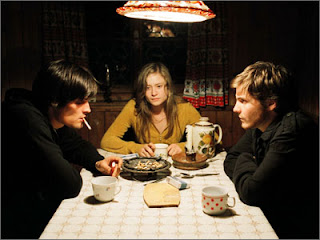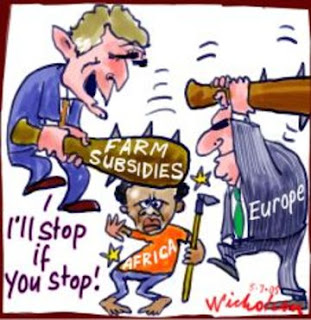A FLAS Fellow's Semester Abroad in Amman
Audrey Dombro, an agricultural and consumer economics student and 2019-20 FLAS fellow, reflects upon her experience studying in Jordan.
Master of Arts in European Union Studies
The European Union Center at the University of Illinois offers the only Master of Arts in European Union Studies (MAEUS) program in the Western Hemisphere. Learn more here.
Nuclear Energy and Its Environmental, Policy, and Security Implications
On Earth Day 2022, the EU Center organized a symposium on the future of technology, energy, and security in Europe, featuring prominent scholars and policy makers from France, Germany, and the U.S.
Conversations on Europe
Watch the collection of online roundtable discussions on different EU issues sponsored by the University of Pittsburgh.
Accelerating Climate Change Mitigation: Policy Statements on the Road to Sharm-El-Sheikh and Beyond
Bruce Murray, Resident Director of the Illinois Program in Vienna, presents a series of student-written policy statements for accelerating climate change mitigation.
Videos of Previous Lectures
Missed an EUC-hosted lecture? Our blog's video tag has archived previous EUC-sponsored lectures.
Tuesday, December 27, 2011
The Appeal of Pan-European Elections for European Parliament
Friday, December 23, 2011
“Edukating” the Rich about Inequalities
“Edukating” the Rich about Inequalities
A Reflection on “The Polish Presidency of the EU: What it Means for Europe and Transatlantic Affairs”
 |
| Consulate General of the Republic of Poland standing with REEEC & EUC staff and faculty |
Maciej Pisarski, Deputy Chief of Mission of the Republic of Poland, gave a presentation on Poland’s place and future in the European Union. The presentation, titled “The Polish Presidency of the EU: What it Means for Europe and Transatlantic Affairs,” was given Friday at the Alice Campbell Alumni Center. In the presentation, Pisarski highlighted the challenges facing Poland with its continuing integration into the European Union. Before explaining Poland’s exact role as President of the European Union, Pisarski gave a quick historical timeline of Poland’s economy and political situation before and after communism:
Late 1940’s – Communist party consolidates power in war-torn Poland
1951 – European Coal and Steel community formed
1957 – Treaty of Rome, establishes European Economic Community
1958 – Riots in Poznan, Hungarian Uprising
1968 – Invasion of Czechoslovakia, suppression of student movements in Poland
1981 – First Mediterranean enlargement, Solidarity movement in Poland. Martial law, economic meltdown, massive foreign debt.
1987 – Single European Act
1989 – Communism ends in Poland
1993 – Treaty of Maastricht establishes European Union
2004 – Poland becomes full member of the European Union
This timeline briefly describes how Poland eventually shook off the yoke of communism and transformed itself into the economic powerhouse it is today. This successful transition gave Poland much legitimacy and led to its warm welcome as the current European Union President.
 |
| Maciej Pisarski poses for a group photo with EUC & REEEC students and faculty |
Poland’s presidency of the EU consists of leading the EU parliament in day-to-day operations involving drafting and voting on legislation, as well as resolving economic and security-related matters. In addition to its regular duties as president, Pisarski explains that integration with Poland’s European members is crucial for future growth and stability. This makes integration a top-priority for Poland as it directs a region of the world which prides itself on travel and business friendly borders. European security is also a top priority for Poland. Since its induction into the European Union in 2004, Poland’s eastern border with Ukraine, Belarus, and Russia has become increasingly well defended. This defense has led some former Eastern Bloc countries to refer to Poland as the “Great Fortress of Europe,” characterizing it as more of a bulwark than an actual country. In a way, this characterization is not too far off.
Poland’s Presidency of the European Union has put it in a very unique and new position. A country that technically did not exist 100 years prior is now leading one of the largest unions of nation-states in history. Poland has taken the role of European Union leader and continues to strive for betterment domestically and in the European sphere.
Mat Jasieniecki currently serves as REEEC office assistant. An Iraqi war veteran, Mat is now pursuing his BA at the University of Illinois majoring in Russia, Eastern Europe, and Eurasia studies. He plans on furthering his study of the polish language by attending an oversees language program in Poland during the summer 2012 term.
A Reflection on “The Polish Presidency of the EU: What it Means for Europe and Transatlantic Affairs”
Thursday, December 22, 2011
Croatia’s Hard-Fought European Moment
Croatia’s Hard-Fought European Moment
The Farm Subsidies Are “Too Damn High”
The Farm Subsidies Are “Too Damn High”
Wednesday, December 21, 2011
Millions of Problems
Millions of Problems
Monday, December 19, 2011
Left, Right, Left: The Unsteady Political Allegiances of Migrants in Western Europe
Left, Right, Left: The Unsteady Political Allegiances of Migrants in Western Europe
Wednesday, December 14, 2011
“The ELP + Me”: Self-Utilization of the European Language Portfolio
 |
| www.linguaconnections.edu |
“The ELP + Me”: Self-Utilization of the European Language Portfolio
Tuesday, December 13, 2011
Guardian of Unity: Poland’s EU Presidency
Guardian of Unity: Poland’s EU Presidency
Monday, December 12, 2011
"Dragon Tattoo": A Minute with Nordic Culture Expert Anna Stenport
Anna Stenport, an EUC Program Board and affiliated faculty member, discusses the American film adaptation of the popular Girl with the Dragon Tattoo series from Sweden. The full interview is posted below, or is available here.
Editor’s note: Turning a book into a movie means making a film that satisfies not only the readers who already know the plot nuances, but also the popcorn crowd, who go to the movies expecting to be entertained. These two hurdles are especially high for “The Girl With the Dragon Tattoo,” based on Swedish author Stieg Larsson’s worldwide bestseller. The movie opens Dec. 21. Professor Anna Westerstahl Stenport directs the Scandinavian studies program at the University of Illinois, and teaches courses in media, cinema and theater. Her current research includes contemporary media culture in the Nordic region. Stenport was interviewed by News Bureau arts and humanities editor Dusty Rhodes.
Larsson’s “Millennium” trilogy has sold more than 27 million copies worldwide. What makes it so popular?
First, it’s a captivating page-turner! It combines a traditional locked-room murder mystery with a corporate thriller and foregrounds a Swedish setting, which is both interesting and exotic to many in the world. Second, Lisbeth Salander is a compelling protagonist whose competing personality traits readers seem to identify with. She is strong and vulnerable, victim and perpetrator, smart and challenged, ruthless and passive. As many readers attest, both male and female, they want to be her. Third, the books interlace the private with the public. They investigate trust and betrayal in families and between sexual partners and expose the underside of a rich, democratic welfare state, revealing its shortcomings.
How do you think it ranks as literature? For example, how commonly are Larsson’s novels taught as college curriculum?
Crime writing is one of the most popular literary genres in the world. Yes, it is often formulaic and pulpy; on the other hand, it is an accessible literary form where critical issues on social and gender equality, human rights, and political corruption, for example, can be directly addressed and reach large readerships. “The Girl With the Dragon Tattoo” has been a staple of book clubs around the world – it is probably one of the most readily available sources of information about 21st century Sweden today. This novel and others by Scandinavian crime writers such as Henning Mankell and Jo Nesboe are often taught in crime-writing college classes and are used in a Scandinavian studies curriculum for critical analyses of contemporary Swedish society.
It’s usually a dicey problem to make a film from a beloved book. What have you heard about how American director David Fincher’s interpretation will compare to the novel, and to the Swedish film?
Fincher chose to spend a total of 14 weeks shooting in Sweden, even though it is expensive to film there. I think he wants to convey an authentic sense of location and maintain the socio-cultural specificity of the novel. The Hollywood version of the film seems to accent the distinctiveness of the Swedish landscape. Sequences remind me of Swedish filmmaker Ingmar Bergman’s dedication to the play of light and darkness characteristic of a northern location. Bergman’s films from the 1950s and ‘60s also helped present the allure of Swedish (sexual) sin to the world. Trailers I have seen present two different stories – one a murder mystery where the relationship between Daniel Craig’s and Mara Rooney’s characters is foregrounded; another a dark and mysterious suspense film with the tag-line “the feel-bad movie of Christmas.” In combination with possible Bergman influences, I think it will be interesting.
How do Swedes feel about an American director taking on a story so grounded in Sweden?
Swedes generally and the Swedish media in particular seem enthusiastic. I believe people are happy to know the film is shot extensively in Sweden. The film industry is global in so many ways these days, and Swedish actors and directors work extensively in Hollywood and elsewhere around the world. The sense of film as a national product, or as representative of one national culture, is diminishing. Fincher’s adaptation of the book and the design of the U.S. film is a further testament to those changes.
For Americans who may not have read any of the books, or seen the Swedish films, what do you hope this movie will show them?
Sweden is known as one of the richest, safest, least corrupt, and most democratic and equitable of all countries in the world. Yet, in the novel “The Girl With the Dragon Tattoo,” the state fails those who need its protection most – Salander included. Similarly, in this novel, none of the many atrocious crimes committed against women – trafficking, forced prostitution, and murder – are ever brought to trial. Instead crimes are hushed up to protect corporations big and small, including a supposedly radical journal critical of the system. And this in a country that regularly lands a top spot on global gender equality lists and prides itself on impartiality in the mass media! I hope Fincher’s film preserves some of this critical edge and this irony.
Editor’s note: To contact Anna Westerstahl Stenport,
call 217-721-5697; email aws@illinois.edu.
"Dragon Tattoo": A Minute with Nordic Culture Expert Anna Stenport
Cell Phones and Online Shopping Sites: Barriers to the European Union’s Single Market?
Cell Phones and Online Shopping Sites: Barriers to the European Union’s Single Market?
Protesting Economic Inequalities: The Edukators and Occupy Wall Street
Protesting Economic Inequalities: The Edukators and Occupy Wall Street
Friday, December 9, 2011
Harmonizing Electric Vehicle Standards in the EU and US
Harmonizing Electric Vehicle Standards in the EU and US
The Importance of M+2 in the EU and Beyond
The Importance of M+2 in the EU and Beyond
Wednesday, December 7, 2011
Laughter through Tears? Germance, Greek Yogurt, and Euro Crisis Humor
by Reneé Gordon Holley
Laughter through Tears? Germance, Greek Yogurt, and Euro Crisis Humor
The Optimism in Poland’s EU Presidency
The Optimism in Poland’s EU Presidency



























